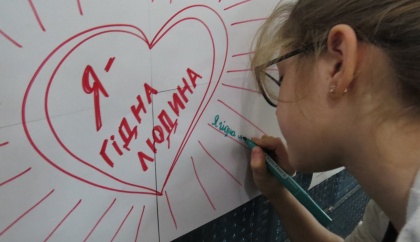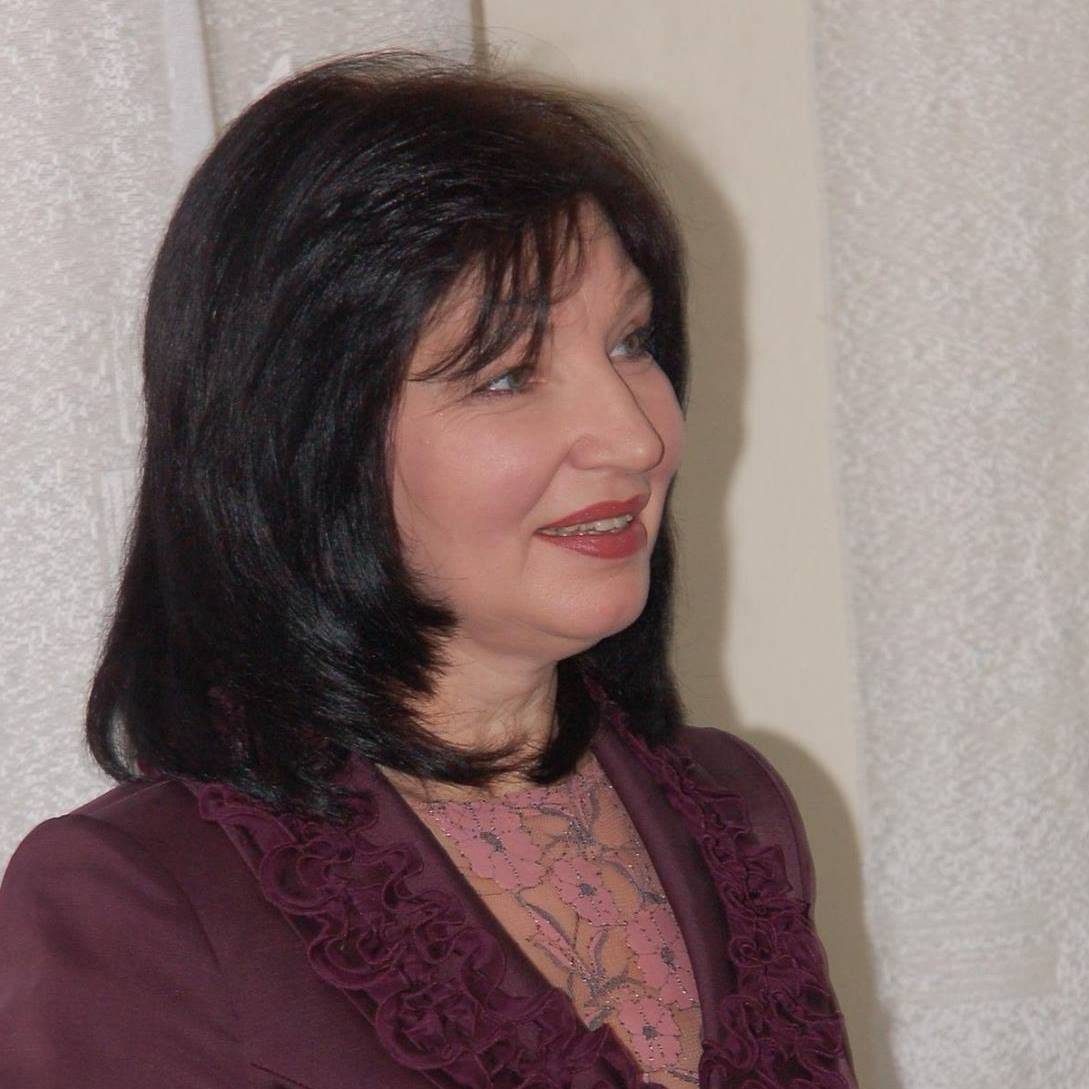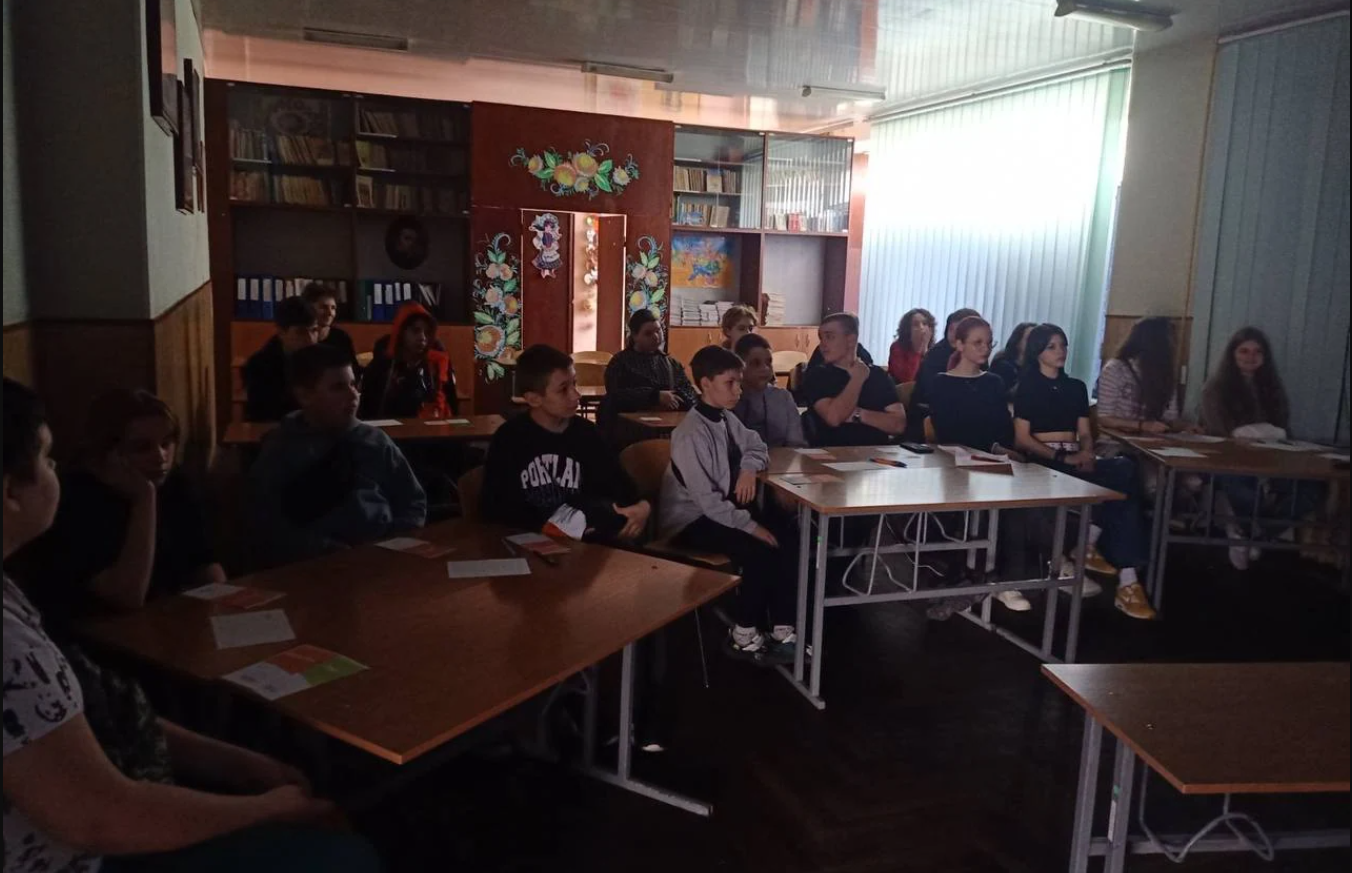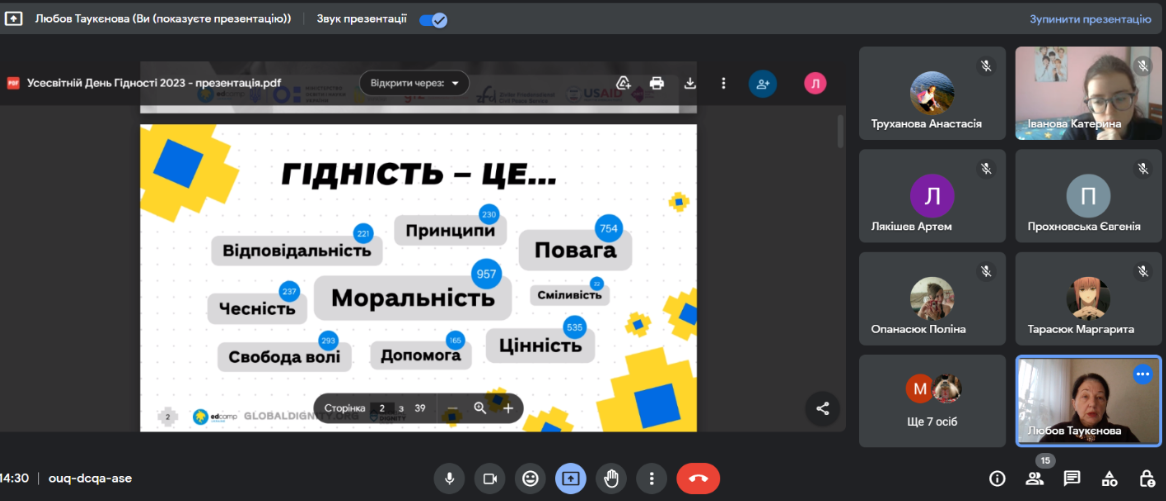
In times of full-scale war, it is crucial to engage teenagers in conversations about critical thinking, countering disinformation, and making moral choices. The documentary film club at Gymnasium No. 38 in Zaporizhzhia strives to make these discussions sincere and truly effective. The club is part of the DOCU/CLUB Network of the NGO Docudays, which comprises more than 450 human rights documentary film clubs all over Ukraine.
By watching and discussing documentary films, students of the gymnasium in Zaporizhzhia are learning to recognize manipulation, develop empathy, and understand the importance of human dignity and personal responsibility for one’s actions. Documentary films help educators discuss with them complex issues — honestly, profoundly, and without unnecessary pathos. Cinema creates a space for reflection, dialogue, and inner growth.
In times of war, such a space is a vital necessity rather than luxury. At the film club, students learn to listen and truly hear one another, to respect differing opinions, and to defend their own values during post-screening discussions and debates.
“My experience with the Docudays UA film clubs began in 2015 at a media literacy seminar in Berdyansk. During one of the training sessions, I watched Oksana Buraja’s documentary Liza, Go Home!, which tells the story of a girl from a problematic family. The idea of showing such films to students impressed me deeply with its potential to develop children’s communication skills, foster critical thinking, and reveal the legal dimensions of life through real-life events on screen. It was a revelation for me,” says Lyubov Taukenova, teacher at the gymnasium and moderator of the film club.
The enthusiastic teacher immediately began organizing documentary film screenings at her school. It soon became clear that this tool helps initiate meaningful conversations with students about bullying and cyberbullying, domestic violence and human dignity, volunteerism and patriotism, as well as legal and environmental issues.
“With these films, I can teach students how to set goals and achieve them, as well as overcome challenges. Our discussions after the screenings help students gain confidence that every individual can become a driving force for change. This is extremely important for their future,” says Lyubov Taukenova.

Lyubov Taukenova, teacher at the gymnasium and moderator of the film club. Photo from Lyubov Taukenova’s personal archive
For the film club moderator, it is essential that this work be systematic rather than a one-time event. Building mutual trust with students and developing their critical thinking skills takes time, yet the importance of these efforts cannot be overstated.
“We are deeply concerned with reports of Russian intelligence services attempting to recruit Ukrainian teenagers via social media. We discuss this issue with our students, explaining the methods of psychological influence used by the enemy and helping them understand their own responsibility. For many children, this is the first experience of having an open conversation on this issue. It is good they have a chance to discuss it at least within the film club,” says Lyubov Taukenova, teacher at the gymnasium and moderator of the film club.
Lyubov Taukenova admits that the outcomes of film discussions are sometimes quite unexpected.
“I often show my students films that deal with bullying and cyberbullying. Once, we watched the French film Swatted, which explores the issue of swatting (a type of cybercrime involving false emergency calls to law enforcement to report fictitious serious crimes - ed.). To be honest, I believed such crimes occurred mostly in the United States or other countries, and I was shocked when my students shared real cases from their own experience. The worst part is that, in such situations, they often don’t know where to turn for help. It is vital to provide them with contact information for hotlines or competent authorities and explain how they can protect themselves,” says Lyubov Taukenova, teacher at the gymnasium and moderator of the film club.
The film club moderator is convinced that documentary films help children “try on themselves” different life situations, analyze the behavior of protagonists, draw inspiration from their stories, and reflect on how the experiences featured in the films can be applied to their own lives. This form of informal education is highly effective: students learn and grow through the examples of real people rather than fictional characters, and they start seeing the world in a new light.

Meeting of the school film club before the full-scale invasion. Photo from Lyubov Taukenova’s archive.
“When I first started the film club at the gymnasium, we used to only meet in person. We had a screening space where students would feel free and comfortable, which allowed for open and emotional communication. It created a special atmosphere. To be honest, when we switched to remote learning, the first screenings were quite challenging. Gradually, we learned how to communicate through the screen as well. Now everyone actively participates in discussions and shares their thoughts,” says Lyubov Taukenova.
The teacher notes that remote learning deprives lessons of the lively dialogue with students, leaving them with little opportunity to express themselves freely or engage in debates.
“There is a great lack of emotionally meaningful communication and live exchange of opinions among children. I remember when, in spring, we were finally allowed to hold an offline screening. We gathered in the classroom, just as before. That discussion moved me to the core! Students from different classes and grades came together. They were genuinely interested. We couldn’t bring ourselves to leave — they kept saying, ‘Let’s stay a little longer, let’s keep talking!’ Everyone missed that sense of real human connection so much,” says Lyubov Taukenova.
Thus, through film discussions and debates, Lyubov Taukenova helps her students develop critical thinking skills and learn to respect others while recognizing their own self-worth.
“Many of my students added the word ‘dignity’ to their vocabulary after our meetings in the film club. It is not a concept people would normally discuss or explain in depth. While watching documentaries, we focus on protection of human dignity and respect for it. This is the foundation for shaping a generation that will make our country better,” says Lyubov Taukenova.
Young participants of the club also confirm that such projects are important for them. Yelyzaveta Shemberko, student at Gymnasium No. 38 in Zaporizhzhia, shares that her classmates always look forward to these sessions:
“It’s always unexpected: we watch films on various topics, with different situations and characters. Every film offers some valuable information that can help us either in adult life or right now. Documentary films get under your skin. When we discuss them, almost no one in the class stays silent — everyone wants to speak,” says Yelyzaveta Shemberko, student of Zaporizhzhia Gymnasium No. 38.

At the film club, children learn to respect human dignity. Photo from Lyubov Taukenova’s archive.
“These are films about real life — they are not glossy, but they are very truthful. Once, we watched the film Hotel 22 about homeless people, and it sparked such heated debates! During regular lessons, we don’t usually talk to each other much; we mostly just answer teachers’ questions. But here, we get to hear what our classmates really think. It’s a very interesting experience for all of us,” says Sofiya Bilets, student of Zaporizhzhia Gymnasium No. 38.
Liubov Taukenova admits that such feedback is perhaps the greatest recognition of the importance of her work.
“It’s crucial for me to help every child understand that they are unique and irreplaceable, that they have the right to their own opinion, and that they can always count on my respect for their views. I hope this will help my students become people of dignity,” says Lyubov Taukenova, teacher at the gymnasium and moderator of the film club.
The development of the DOCU/CLUB Network is funded by the Embassy of Sweden in Ukraine, the National Endowment for Democracy (NED), and Fondation de France.
The opinions, conclusions, or recommendations are those of the authors and compilers of this publication and do not necessarily reflect the views of the governments or charitable organizations of these countries. The authors and compilers are solely responsible for the content of this publication.



